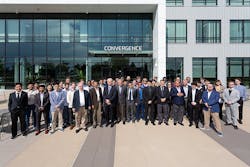Latest from Research and Development
Security threats in computer systems and electronics are often focused on software and the gaps unintentionally left to be hacked. However, the underlying microelectronics that form computer and electronic systems have the exact same potential to be hacked and need to be brought into the conversation.
As this knowledge has come to light, Purdue University's Center for Secure Microelectronics Ecosystem (CSME) has taken on this challenge by developing the latest advances to protect today's and tomorrow's microelectronics and semiconductors. To do so, they are leading the effort for better security through research advances in microelectronics and through grants funded by the center's industrial and government partners for research projects across the nation.
“Initial chip design, fabrication, and the final packaging into circuit boards is spread out across not only companies but also countries now,” said Joerg Appenzeller, CSME co-director and Purdue’s Barry M. and Patricia L. Epstein Professor of Electrical and Computer Engineering. “This center ensures the semiconductor industry will be more resilient and prepared for security challenges, both large and small.”
CSME was announced in the spring of 2022 as a part of Purdue’s continued leadership in semiconductors. It's joined by university partners Arizona State, the University of Florida, Texas A&M, and Georgia Tech. The center launched with support from founding companies TSMC and Synopsys in conjunction with support through a Department of Defense-funded workforce development program.
This new level of security that's needed to protect essential chips for everything from your car and cellphone to artificial intelligence and machine learning, not to mention the microelectronics supply chain itself, is basically like looking for a needle in a haystack, muses CSME.
Interested in reading about cybersecurity and economic policies? Check out the latest headlines on these topics from IndustryWeek, an NED sister publication in Endeavor's Manufacturing Group.
“Hardware security threats range from recycling older components as new, counterfeit parts to accidental or deliberate modifications to hardware that leaks sensitive information or causes malfunction in the field, to name a few,” said Anand Raghunathan, CSME co-director and the Silicon Valley Professor of Electrical and Computer Engineering. “Our researchers are pursuing advances that will ensure a secure microelectronics ecosystem by eliminating traditional and emerging security attacks.”
Purdue has established itself as a national leader in microelectronics research, spanning the semiconductor ecosystem in software and hardware. CSME is one of six major centers serving as anchors for that work, with a number of ongoing research projects focusing on various aspects of design, packaging, and reliability.














